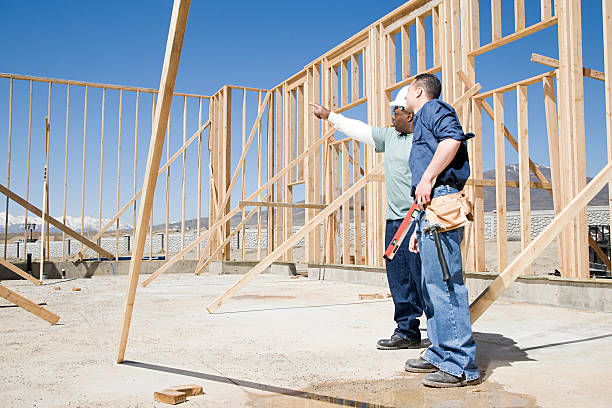‘
Confused about when builders are permitted to work between 8 AM and 6 PM? Discover the official guidelines that keep both construction teams and neighbours happy.
Standard Construction Working Hours in the UK
In the United Kingdom, construction working hours are carefully regulated to balance the needs of the building industry with the comfort of local residents. While the commonly cited hours of 8 AM to 6 PM are often referenced, the actual permitted working hours can vary significantly depending on location and project type. Most local authorities in the UK typically permit construction work between 7 AM and 6 PM on weekdays, though some metropolitan areas may enforce stricter start times of 8 AM. These regulations aim to minimize disruption while allowing sufficient time for essential construction activities.
Weekday Construction Hours
The standard working pattern for construction in the UK follows a structured schedule that prioritizes productivity while respecting community needs. Most local councils permit the following working hours:
- Monday to Friday: 7 AM/8 AM to 6 PM (varying by location)
- Core working hours: 8 AM to 4 PM (when most intensive work occurs)
- Quiet work periods: First and last hour of the day
- Site preparation: Usually allowed 30 minutes before official start time
It’s worth noting that some London boroughs and other major cities may enforce an 8 AM start time to reduce morning disruption in densely populated areas.
Weekend and Bank Holiday Restrictions
Weekend and bank holiday construction hours are more restrictive to provide residents with periods of respite. Typical weekend working hours are:
- Saturdays: 8 AM to 1 PM (some areas allow until 2 PM)
- Sundays: Generally no noisy work permitted
- Bank Holidays: Usually no construction work allowed
- Special permissions may be required for any work outside these hours
Factors Affecting Construction Hours
Several key factors influence when builders can operate on site. These include local authority guidelines, project type, location, and environmental considerations. Recent data shows that 73% of UK councils have specific noise control policies that directly impact construction hours. Understanding these factors is crucial for project planning and maintaining compliance with local regulations.
Local Authority Guidelines
Each local authority in the UK sets its own specific guidelines for construction hours, which typically consider:
- Residential area density and proximity to schools or hospitals
- Historical noise complaints and community feedback
- Environmental health regulations
- Type of construction activity planned
- Local development frameworks and policies
Project Type Considerations
Different construction projects often require varying working patterns and hours. Commercial projects might follow different schedules compared to residential work, while infrastructure projects may have special dispensations. According to industry data, commercial construction sites typically operate on a 5/8 schedule (five days a week, eight hours per day), while larger infrastructure projects might run extended hours with appropriate permissions.
Managing Construction Hours Effectively
Successful construction projects require careful management of working hours to maximize productivity while maintaining good relationships with the local community. This involves strategic planning of noisy works, clear communication with neighbours, and efficient scheduling of deliveries and major works during core hours.
Noise Management and Neighbour Relations
Maintaining positive relationships with neighbours is crucial for construction projects. Best practices include:
- Providing advance notice of particularly noisy works
- Establishing a dedicated contact person for complaints
- Implementing noise reduction measures during sensitive hours
- Monitoring and recording noise levels regularly
- Responding promptly to any concerns raised
Worker Rights and Scheduling
Construction workers in the UK are protected by robust employment laws that govern working hours and conditions. Key considerations include:
- Maximum 48-hour average working week (unless opted out)
- Minimum 11 hours rest between working days
- Regular breaks during working hours
- Overtime payments for extended hours
- Special considerations for night work when required
Special Circumstances and Exceptions
While standard construction hours are well-defined, certain situations may warrant exceptions. Emergency works, essential public works, and time-critical projects may receive special dispensation to operate outside normal hours. However, these exceptions typically require proper documentation and approval from local authorities.
Emergency Works
Emergency construction work can occur outside standard hours when addressing:
- Immediate safety hazards
- Essential utility repairs
- Structural emergencies
- Public safety concerns
- Critical infrastructure maintenance
Planning Permission and Special Permits
For work outside standard hours, contractors must usually obtain special permits. This process typically involves:
- Detailed application to the local authority
- Impact assessments and mitigation plans
- Consultation with affected residents
- Regular monitoring and compliance reporting
- Time-limited permissions with specific conditions
Practical Tips for Construction Time Management
To maximize efficiency within permitted working hours, construction teams should:
- Plan noisy works for mid-morning to mid-afternoon
- Schedule deliveries outside peak traffic times
- Coordinate subcontractors to optimize site activity
- Use quiet periods for planning and preparation
- Maintain clear communication with all stakeholders
Conclusion
Understanding and adhering to permitted construction hours is essential for successful project delivery. While the standard 8 AM to 6 PM window provides a general framework, actual working hours can vary based on location, project type, and special circumstances. By carefully planning work schedules, maintaining good community relations, and following local authority guidelines, construction projects can progress efficiently while minimizing disruption to nearby residents.
‘
FAQ
Can roofers work at night?
Roofing work at night increases risks of falls and fires, and reduces quality of craftsmanship. It should be avoided.
Are construction workers allowed to play music?
A new guidance letter from the Occupational Safety and Health Administration (OSHA) indicates it is legal, but not generally advisable, for workers to use headphones to listen to music on a construction site even if the headphones are marketed as “OSHA approved.”
What time can roofers start working?
Roofers usually start working at about 7 am in residential areas and 5 in the morning in commercial areas. This allows them plenty of time to get some good work done before it gets too hot on the roof, but not so early that you have to worry about too much noise in the neighborhood.
Can my neighbour do building work on a Sunday in Lambeth?
Construction and building work are only allowed at set times. You can report noise from construction or building work if it happens during a time when it is not allowed. It is not allowed on Sunday or bank holidays.
Sources
[1] https://www.homesandgardens.com/life-design/what-time-can-construction-workers-start-making-noise
[2] https://www.youtube.com/watch?v=RLDRI7xa8v0
[3] https://www.overtime-flsa.com/blog/how-long-do-construction-workers-work-understanding-flsa-regulations/


Leave a Reply